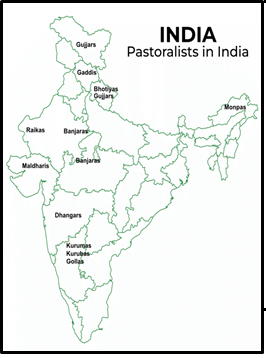UN: INDIAN PASTORALISTS NEED LAND ACCESS, RIGHTS RECOGNITION IMPROVEMENTS
Why in the news?
- UN report highlights need for better land access and rights recognition for Indian pastoralists.
- Focus on rangeland degradation and marginalisation of pastoralist communities.
- The UN Convention on Combating Desertification reports that nearly half of the world’s rangelands are degraded due to climate change and land-use changes.
Understanding Rangelands:
- Definition: Rangelands are extensive areas with native vegetation grazed by domestic or wild herbivores, covering 40–50% of Earth’s land.
- They include tallgrass prairies, steppes, desert shrublands, savannas, chaparrals, tundras, and some forests.
- Rangelands are managed by controlling grazing animals, unlike pasturelands with human-established plants.
- Supports diverse ecosystems and plays a crucial role in wildlife habitat and livestock grazing.
source:slideshare
About United Nations Convention to Combat Desertification (UNCCD):
About Pastoralism in India:
|




